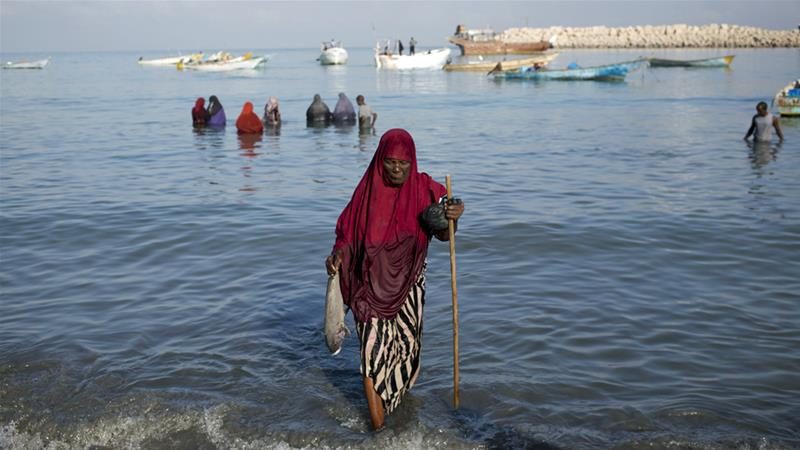
BANDAR BEYLA, Somalia | Abriil 21, 2017 – At dawn, a group of women extend their fishing nets over the beach sand before sailing out to sea on rickety fishing boats seeking something to eat.Nowadays, Somali people have two options in their daily survival game: one is fishing, the other one is piracy, which – after years of inactivity – has made a comeback.
In Bandar Beyla, a small coastal hamlet in the semi-autonomous region of Puntland (Northeast Somalia), its population depends exclusively on fishing for their survival.
Between 2010-2012, this region was a pirate hotspot. To combat piracy, the United Nations Food and Agriculture Organization launched training programs designed for the younger population to learn fishing techniques and build sturdier fishing boats.
Johro Said Imaan, 40, walks down every day to the beach to go out fishing. But she finds it increasingly difficult to feed her 10 children as the months-long drought affecting Somalia has sent food and water prices spiraling. This situation is aggravated by the international fishing fleets illegally fishing off the Somali coast.
Said presides the Bandar Beyla women’s association, which offers education, training, and advice on the fishing business to the villagers. “Before, our family income relied on cattle and fishing. Now, because of the drought, we depend solely on fishing,” Said told EFE.
Although they are reluctant to talk about it, many of the women’s husbands are in prison due to their involvement in piracy. The fate of these families now depends on the wives and mothers.
According to the UN, some 1,300 pirates have been imprisoned in recent years.
However, in the past months, the number of international fleets illegally fishing off the coast of Somalia has grown – this despite the fact that fishing within 200 nautical miles of Somalia’s coast requires a government permit, a regional expert told EFE off-the-record.
While the locals denounce the pillaging of their fisheries, Somali pirates launched a series of attacks last week that raised the alarm among the International Community.
The most recent attack took place on April 1, when an Indian vessel was assaulted and its crew taken hostage by pirates. The crew was freed by security forces 10 days later.
With the return of piracy, the UN has called for more vigilance in this Indic ocean region, where the security situation had considerably improved, in part thanks to the EU’s Atalanta naval mission deployed since 2008.
Many believe piracy never left Somalia: it simply went underground as shipping companies improved overall security, embarked armed security teams and fostered community support programs among the local Somali population. While the pirates are a worry for the International Community, Somalis fight every day against a worsening drought and the latest cholera epidemic, which has already killed hundreds. If no immediate measures are taken, Somalia will suffer by mid-2017 a new mass famine, similar to the one in 2011 that killed around 250,000 people.
.
.
________________________________
_____________________________________________________________________________________
Xafiiska Wararka Qaranimo Online | Mogadishu, Somalia
_____________________________________________________________________________________Advertisement
_____________________________________________________________________________________







